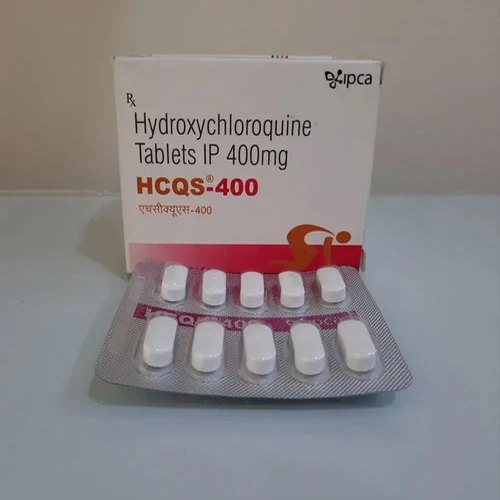HCQS 400: Mechanism of Action, Indications, and Side Effects

HCQS 400, also known as Hydroxychloroquine 400 mg, is a medication with a diverse range of uses, from treating malaria to autoimmune conditions like rheumatoid arthritis and lupus. Recently, it gained widespread attention due to its potential role in managing COVID-19 during the early stages of the pandemic. This blog explores HCQS 400 in detail, including its mechanism of action, approved indications, off-label uses, potential side effects, and current controversies surrounding its use.
Mechanism of Action:
Hydroxychloroquine online belongs to a class of medications known as antimalarials and disease-modifying antirheumatic drugs (DMARDs). Its precise mechanism of action is not fully understood, but it is thought to exert its effects through several mechanisms:
-
Antimalarial Action: HCQS 400 accumulates in acidic compartments like lysosomes within parasites, raising their pH and interfering with essential processes, thereby killing Plasmodium parasites responsible for malaria.
-
Immunomodulatory Effects: In autoimmune diseases like rheumatoid arthritis and lupus, HCQS 400 is believed to modulate the immune system by inhibiting toll-like receptors and interfering with antigen processing, reducing the production of pro-inflammatory cytokines.
-
Antiviral Properties: In addition to its established uses, HCQS 400 has shown some in vitro activity against viruses like SARS-CoV-2, the virus responsible for COVID-19, by altering pH-dependent steps in viral replication.
Indications:
HCQS 400 is approved for several medical conditions, primarily:
-
Malaria: HCQS 400 is used for the treatment and prophylaxis of malaria caused by Plasmodium species, including Plasmodium falciparum and Plasmodium vivax.
-
Autoimmune Diseases:
- Rheumatoid Arthritis: HCQS 400 is used as a DMARD to reduce inflammation and pain associated with rheumatoid arthritis, and to slow disease progression.
- Systemic Lupus Erythematosus (SLE): It is used to manage symptoms of lupus, such as joint pain, skin rashes, and fatigue.
Off-Label Uses:
Beyond its approved indications, HCQS 400 has been prescribed off-label for various conditions, including:
-
COVID-19: During the early stages of the COVID-19 pandemic, HCQS 400 gained attention as a potential treatment or preventive measure. However, subsequent studies and clinical trials have provided conflicting results regarding its efficacy in treating COVID-19.
-
Chronic Q Fever: HCQS 400 has been used in combination with antibiotics for treating chronic Q fever, a bacterial infection caused by Coxiella burnetii.
Side Effects and Safety Considerations:
While generally well-tolerated when used appropriately, HCQS 400 can cause side effects, particularly with prolonged use or at higher doses. Common side effects include:
-
Gastrointestinal Disturbances: Nausea, vomiting, diarrhea, and stomach cramps may occur, especially during the initial stages of treatment.
-
Dermatological Reactions: Skin rash, itching, and changes in pigmentation (usually reversible) can occur, particularly in patients with lupus.
-
Ocular Effects: Rare but serious side effects include retinopathy (damage to the retina) with long-term use, which can lead to vision impairment. Regular ophthalmologic monitoring is recommended for patients on prolonged HCQS 400 therapy.
-
Cardiac Effects: There is a risk of QT prolongation (an abnormality in the heart’s electrical cycle), particularly when HCQS 400 is used in combination with other medications that also prolong QT interval.
-
Neurological Effects: Headache, dizziness, and mood changes have been reported in some patients.
Controversies and Regulatory Guidance:
The use of HCQS 400, especially in the context of COVID-19, has been controversial:
-
COVID-19 Pandemic: Early observational studies suggested potential benefits of HCQS 400 in reducing viral load and improving clinical outcomes in COVID-19 patients. However, subsequent randomized controlled trials and systematic reviews have not consistently supported these findings.
-
Regulatory Considerations: Regulatory agencies such as the FDA in the United States and the EMA in Europe have cautioned against the widespread use of HCQS 400 for COVID-19 outside of clinical trials due to the lack of robust clinical evidence and potential risks.
-
Clinical Guidance: Current clinical guidelines recommend against routine use of HCQS 400 for COVID-19 treatment or prevention outside of controlled clinical trials. The focus remains on established preventive measures, vaccination efforts, and evidence-based treatments.
Conclusion:
HCQS 400 (hydroxychloroquine sulfate) is a versatile medication with established roles in treating malaria and managing autoimmune diseases like rheumatoid arthritis and lupus. While it has shown some antiviral properties and gained attention during the COVID-19 pandemic, its efficacy in treating COVID-19 remains uncertain and controversial. Healthcare providers must weigh potential benefits against known risks when considering HCQS 400 for any indication, ensuring patient safety through careful monitoring and adherence to clinical guidelines. Ongoing research and clinical trials will continue to inform our understanding of HCQS 400’s role in managing diseases and its potential applications in future medical contexts.

 Smile Brighter: Meet Canberra’s Top Dental Hygienists
Smile Brighter: Meet Canberra’s Top Dental Hygienists  Transform Your Comfort: Discover the Benefits of Cushions Lab Seat Cushions and Pillows
Transform Your Comfort: Discover the Benefits of Cushions Lab Seat Cushions and Pillows  Enhance Your Mental Clarity with Modafresh 200
Enhance Your Mental Clarity with Modafresh 200  List of Top 10 Neurologists in India 2024
List of Top 10 Neurologists in India 2024  Body Care Products Manufacturers: Providing Quality Products for Your Skincare Needs
Body Care Products Manufacturers: Providing Quality Products for Your Skincare Needs  The Journey to the Best Microblading in Dubai: A Client’s Perspective
The Journey to the Best Microblading in Dubai: A Client’s Perspective  Exploring London’s Best Butcher Shops
Exploring London’s Best Butcher Shops  Enhance Your Shop Appeal with Sydney’s Best Carpentry Services
Enhance Your Shop Appeal with Sydney’s Best Carpentry Services  A Detailed Look at the Features of the LEGO Technic Mars Crew Exploration Rover
A Detailed Look at the Features of the LEGO Technic Mars Crew Exploration Rover